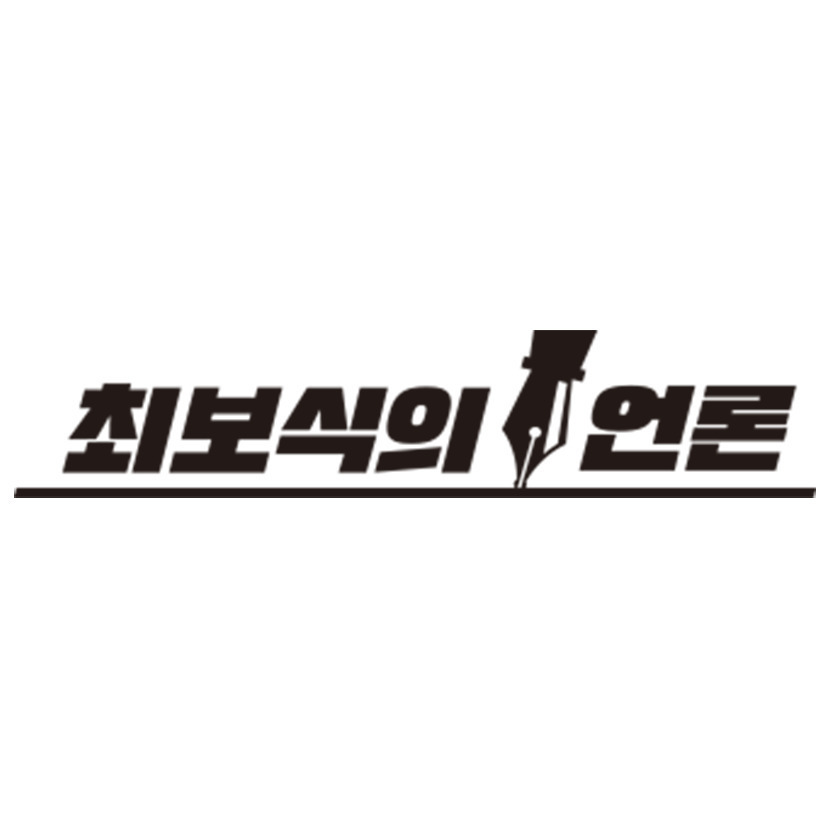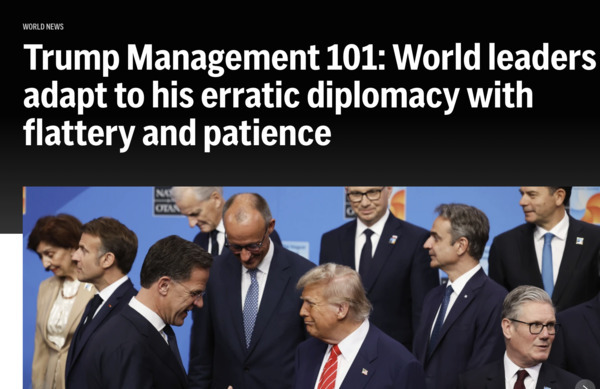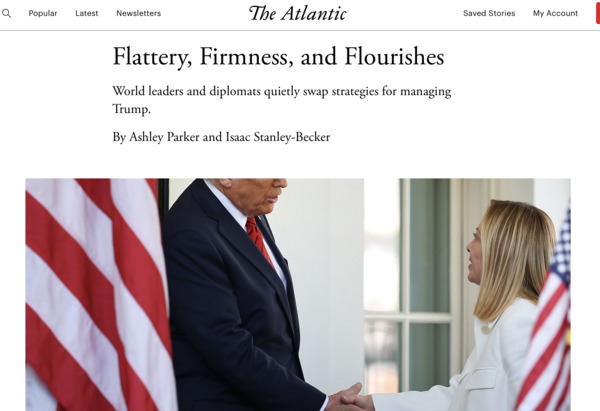127 읽음
세계 정상들 사이에서 공유된 '트럼프 관리법' 족보? ... AP 보도
 최보식의언론
최보식의언론 0
0
‘족보’의 핵심은 ‘과도한 칭찬, 시선을 다른 데로 돌리는 전술(아첨과 강경함), 그리고 화려한 기교, 골프 전술’ 등으로 예상치 못한 상황에 대비하고 또 대비해야 한다는 것이다.
이 토픽은 파이낸셜 타임스가 지난해 11월 9일 자 ‘Flattery, distraction and golf: world leaders dust off their Trump playbooks’(아부, 화제 전환, 그리고 골프: 세계 정상들이 다시 꺼낸 ‘트럼프 대응 매뉴얼’)라는 제목의 기사로 처음 보도했다.
그 뒤 AP가 올 7월 28일 자 ‘Trump Management 101: World leaders adapt to his erratic diplomacy with flattery and patiencecy’(트럼프 관리학 개론: 세계 정상들은 아부와 인내로 그의 변덕 외교에 적응한다)라는 제목으로 보도한 바있다.
최근 애틀란틱도 “트럼프 전 대통령이 다시 미국의 권력을 쥔 이후 세계 각국 지도자들이 트럼프를 관리하는 관리법을 공유하고 있다"며 “핵심 전략은 아부(flattery), 단호함(firmness), 그리고 개인 맞춤형 제스처(flourishes)”이라고 전했다.
이 기사에 따르면, 조르자 멜로리 이탈리아 총리가 백악관 방문했을때 "트럼프의 스타일에 맞춘 언어와 칭찬으로 그의 호감을 사서 회담을 무사히 마쳤다"며 '사전 준비는 철저했으며, 트럼프가 좋아할 ‘강한 이미지’와 ‘보수적 가치’를 부각했다"고 한다.
요나스 가르 스퇴레 노르웨이 총리는 트럼프를 처음 대면하기 전 세계 정상들의 사례를 분석했다고 한다. 그가 기자 회견 때 “트럼프가 나서야 한다”고 강조했으며, 그의 존재감을 인정하는 멘트를 의도적으로 사용했다고 이 신문은 전했다.
마르크 뤼터 나토 사무총장은 트럼프에게 “가끔은 아빠가 강하게 말해야 한다(Daddy has to use strong language)”는 식으로 비유하며 NATO 분담금 증액과 우크라이나 지원 지속을 유도했다. 그의 친근하면서도 능숙한 ‘언어 유희’가 효과를 봤다는 분석이다.
마크롱(프랑스), 네타냐후(이스라엘), 젤렌스키(우크라이나)도 '골프 초대', '감성 호소', '트럼프 브랜드에 대한 칭송' 등의 방식으로 접근해, 개인적인 관계를 중시하는 트럼프의 '인정받고 싶어하는 욕구'를 적절하게 잘 구사했다는 평이다.
다음은 AP의 기사 ‘Trump Management 101: World leaders adapt to his erratic diplomacy with flattery and patiencecy’의 전문이다. (편집자)
트럼프 전 대통령이 두 번째 임기 초반을 보내는 가운데, 세계 지도자들이 그를 다루는 방법에 대해 비공식적인 강좌를 열고 있는 듯하다.
그들의 수업 계획은 이렇다. 칭찬을 아낌없이 쏟아라. 그가 국제무대에 던지는 정책 토끼들을 쫓지 말라. 위협은 일단 지켜보며 구체적으로 원하는 바가 무엇인지 파악하고, 가능하다면 그것을 제공할 방법을 찾아라.
오벌 오피스 회담과 정상회담(Oval Office meeting and summit, 오벌 오피스는 개인 집무실 이름)이 거듭될수록 각국 정상들은 이 미국 대통령과 실리적 관계를 구축하기 위한 전술과 전략을 정립하고 있다.
그 결과는 최근 NATO 회의에서 드러났다. 정상들은 트럼프에게 찬사를 보냈고, 회의는 짧아졌으며, 민감한 의제는 아예 제외되었다.
트럼프가 국제 정치를 지배하는 현실에서 각국 지도자들은 첫 임기 때의 경험을 바탕으로 서로 배우고 있다. 당시 그는 미국의 NATO 탈퇴를 위협하기도 했다. 그에게서 배울 수 있는 몇 가지 특징은 다음과 같다.
그는 전통적 외교를 경멸한다. ‘미국 우선(America First)’, ‘최고의 거래(The best deal)’, 그리고 “비교 불가(Not even close)”를 즐겨 말한다. 그는 직감으로 움직이며, 세계는 그의 변화무쌍한 행보를 따라가야 한다.
예컨대, 그의 명령, 위협, SNS 게시물은 우선순위를 시시각각 바꿔버린다. 그는 자신을 협상에서 ‘유연하다(flexible)’고 표현하며, 실제로도 캐나다·멕시코·중국에 대규모 관세를 부과하겠다고 위협했다가 협상 중 물러나기도 했다. 그는 이란-이스라엘 전쟁 휴전을 자화자찬했지만, 우크라이나와 가자지구 분쟁 종식 약속은 아직 이행하지 않았다.
이번 주 트럼프가 스페인에 보복 관세를 부과하겠다고 위협한 데 대해, 벨기에 바르트 더 웨버 총리는 “그건 우리 모두에게 수수께끼”라고 밝혔다. “만약 그 관세가 실제로 시행되지 않는다면, 처음 그런 위협이 헛된 것은 아닐 것이다. 그는 늘 마음을 바꾼다. 나는 트럼프가 말한다고 해서 매번 반응하는 지도자가 아니다.”
훈육 외교 대 ‘아빠 외교’
이번 달 두 차례의 정상회의—캐나다의 G7, 네덜란드의 NATO—는 트럼프를 대하는 상반된 접근 방식을 보여준다. 두 회의는 서로 바다를 사이에 두고, 그의 재임 6개월을 맞아 열렸다.
6월 중순 캐나다 앨버타에서 열린 G7에서, 마크 카니 캐나다 총리는 트럼프의 생일을 축하하며 “G7은 미국의 리더십 없이는 아무것도 아니며, 미국 대통령 개인의 리더십이 그 핵심”이라며 약간의 아부를 섞었다. 그러나 트럼프가 발언을 정치적 방향으로 돌리자, 카니는 “이제 회의를 시작해야 합니다”라며 브리핑을 끊어버렸다.
트럼프는 이에 고개를 끄덕이는 듯했지만, 6월 16일 월요일, 이스라엘-이란 충돌이 심화되자 하루 일찍 정상회의를 떠났다. 그는 일요일 새벽 미 공군에 이란 핵시설 두 곳에 3만 파운드짜리 폭탄을 투하하라고 명령했고, 수요일에는 SNS에 “완전하고 전면적인 휴전”을 선언했다. 이후 48시간 동안 그의 감정은 환희에서 분노, 그리고 승리감으로 급변했다. 협상은 성사 직전 무너질 뻔하다 다시 봉합되었다.
트럼프는 이스라엘과 이란을 향해 마감 기한을 넘겨 서로를 공격했다며 공개적으로 욕설을 포함한 강한 어조로 질타했다. 이어 NATO 집단 방위 조항에 대한 지지를 철회할 수도 있다는 말까지 했다.
이런 분위기 속에서 그는 수년간 비난해온 NATO 회담장으로 향했다.
NATO는 트럼프를 맞을 준비를 마쳤다
NATO는 실질적으로 미국 중심의 조직이다. 유럽과 캐나다는 미군의 전략적 수송, 공중 급유, 병참 등에서 미국 없이는 움직일 수 없다. 특히 핵 억지력 면에서는 미국에 절대적으로 의존한다.
6월 25일 회의는 몇 시간짜리로 간소화됐고, 트럼프가 집요하게 요구해온 회원국 방위비 증액이 유일한 의제로 채택되었다. 우크라이나 전쟁 문제는 의제에서 완전히 제외되었다.
트럼프는 볼로디미르 젤렌스키 우크라이나 대통령과 단독으로 만났으며, 젤렌스키는 2월 백악관 회의에서 트럼프에게 호된 질책을 받은 뒤부터 그의 ‘거래 중심’ 스타일에 맞춘 화해 전략을 사용해왔다.
트럼프를 자극하지 않는 것이 이번 NATO 회의의 목표였다. 그는 네덜란드 왕궁에 초대되어 왕가와 만찬도 가졌다. 대부분의 회원국은 방위비 증액에 동의할 예정이었다.
다른 NATO 대사들은 사무총장 마르크 뤼터에게 ‘트럼프와 통하는 기술’을 발휘해 달라고 부탁했다. 뤼터는 정상회의 전 “당신은 반드시 성공할 것”이라는 개인 메시지를 트럼프에게 보냈고, 트럼프는 이를 SNS에 자랑하듯 게시했다.
회의장에서 뤼터는 트럼프가 이란-이스라엘 전쟁을 중재한 역할을 두고 “학교 운동장 싸움을 말리는 아빠”에 비유했다.
“그는 나를 좋아합니다”라고 트럼프는 해석했다.
아부 외교에 쏟아지는 비판
리투아니아 전 외무장관 가브리엘리우스 란즈베르기스는 이를 두고 “이건 약함과 비굴함의 찬가”라며 강하게 비판했다. “표현이 성인 산업에서 따온 듯하다. 유럽을 구걸하는 존재로 전락시킨다.”
이러한 비판에도 불구하고, 트럼프에게는 칭찬이 최고의 대응법이라는 것은 여러 정상들이 공유하는 비공식 전략이 되었다.
이스라엘의 베냐민 네타냐후 총리는 2018년부터 트럼프를 “이스라엘 역사상 가장 위대한 친구”라고 치켜세웠고, 골란 고원의 한 정착촌에는 그의 이름을 붙이기도 했다. 일본의 고 아베 신조 총리는 트럼프와 수차례 골프 회동을 가졌고, 프랑스의 에마뉘엘 마크롱 대통령은 바스티유 데이에 트럼프를 초청해 군사 퍼레이드를 열었다.
트럼프가 남긴 것
뤼터는 트럼프가 회원국에 요구한 GDP의 5%를 국방비로 사용하라는 요구를 실현 가능하도록 조율했다. 우크라이나 지원금의 일부를 국방비로 간주하는 방식이었다. 그러나 미군 감축과 같은 큰 사안은 여전히 결론이 나지 않았고, 향후 안보 공백을 초래할 가능성도 남았다.
SNS에서는 NATO를 “북대서양 트럼프 기구(North Atlantic Trump Organization)”라고 부르기도 했다.
미 국가안보보좌관 출신 피오나 힐은 BBC에 이렇게 말했다. “이번 정상회의는 전부 트럼프를 ‘관리’하기 위한 것이었고, 그가 ‘올바른 순간에 올바른 말을 하도록’ 만드는 것이 전부였다.”
회의 말미, 정상들은 “그가 회의에 참석했고, 망치지 않았으며, 중도 퇴장하거나 싸움을 벌이지 않았다”는 점만으로도 성공이라 평가했다. 무엇보다, NATO는 살아남았다. 그리고 트럼프는 “이제는 동맹에 대한 나의 입장이 바뀌었다”고 말했다.
그리고 왕궁에서의 하룻밤에 대해선 이렇게 전했다.
“푹 잘 잤습니다.”
「영문 원문 기사」
Trump Management 101: World leaders adapt to his erratic diplomacy with flattery and patiencecy with flatte
If world leaders were teaching a course on how to deal with U.S. President Donald Trump early in his second term, their lesson plan might go like this: Pile on the flattery. Don't chase the policy rabbits he sends running across the world stage. Wait out the threats to see what, specifically, he wants, and when possible, find a way to deliver it.
With every Oval Office meeting and summit, the leaders of other countries are settling on tactics and strategy in their pursuit of a working relationship with the emboldened American leader who presides over the world's largest economy and commands its most powerful military. The results were there to see at NATO, where leaders heaped praise on Trump, shortened meetings and removed contentious subjects from the agenda.
Given that Trump dominates geopolitics, foreign leaders are learning from each other's experiences dating to Trump's first term, when he reportedly threatened to withdraw the U.S. from the alliance. Among the learnable Trumpisms: He disdains traditional diplomacy. With him, it's " America first," it's superlative - and " it's not even close. " He goes with his gut, and the world goes along for the ride.
They're finding, for example, that the sheer pace of Trump's orders, threats and social posts can send him pinging from the priority of one moment to another. He describes himself as "flexible" in negotiations, such as those in which he threatened big tariffs on Canada, Mexico and China only to back down during talks. And while Trump claimed credit for the ceasefire in the Iran-Israel war, he also has yet to negotiate ending the conflicts in Ukraine and Gaza as promised.
Trump's threat this week to levy retaliatory tariffs on Spain, for example, "is a mystery to everyone," Belgian Prime Minister Bart De Wever told reporters Thursday during a summit in Brussels. If the tariffs never happen, he said, "It won't be the first time that things don't turn out as bad as they seem at first glance. Or that he changes his mind. I'm not the kind of leader who jumps every time Mr. Trump says something.“
Trump management 101: Discipline vs 'daddy diplomacy'
Two summits this month, an ocean apart - the Group of Seven in Canada and NATO in The Netherlands - illustrate contrasting approaches to the American president on the brink of his 6th month back in office.
Meeting in mid-June in Alberta, Canadian Prime Minister Mark Carney welcomed Trump at a press conference by wishing him a happy birthday and adding a smidgen of flattery: "The G7 is nothing without U.S. leadership and your personal leadership of the United States." But when Trump turned partisan, Carney cut off the event, saying: "We actually have to start the meeting."
Trump appeared to nod in agreement. But later, on Monday, June 16, he abruptly departed the summit a day early as the conflict between Israel and Iran intensified.
Trump ordered U.S. pilots to drop 30,000-pound bombs early Sunday on two key underground uranium enrichment plants in Iran, and by Wednesday announced on social media "a Complete and Total ceasefire." What followed was a 48-hour whirlwind during which Trump veered from elated to indignant to triumphant as his fragile Israel-Iran ceasefire agreement came together, teetered toward collapse and ultimately coalesced.
Trump publicly harangued the Israelis and Iranians with a level of pique and profanity that was notable even for him. Chiding the two countries for attacking each other beyond a deadline, he dropped the f-word. Not finished, he then cast doubt on his support for NATO's mutual defense guarantee.
Such was the president's mood as he winged toward a meeting of the trans-Atlantic alliance he had disparaged for years.
NATO was ready for Trump with a summit set to please him
NATO is essentially American, anyway. The Europeans and Canadians cannot function without American heavy lift, air refueling, logistics and more. Most of all, they rely on the United States for its range of nuclear weapons for deterrence.
The June 25 summit was whittled down to a few hours, and one Trump-driven subject: Raising the amount of money the member nations spent on defense to lighten the load carried by the United States.
Emphatically not on the agenda: Russia's ongoing war with Ukraine. Trump did, however, meet with President Volodymyr Zelenskyy, who has climbed his own learning curve on Trump management since Trump berated him in the Oval Office in February. The Ukrainian leader has deployed a conciliatory approach and mirrored Trump's transactional style.
The goal, widely reported, was to avoid doing anything that might cause Trump to blow up the event or leave. Trump was invited to stay at the royal palace in The Hague and dine with the royal family. It was expected that most members would endorse the plan to raise their spending targets for their one-for-all defense against Russia.
The other NATO ambassadors had told Secretary-General Mark Rutte to deploy his Trump-whispering skills. He sent the president a private, presummit text predicting Trump would achieve "BIG" success there, which Trump posted on his own socials for all to see. At the summit, Rutte likened Trump's role quieting the Iran-Israel war to a "daddy" interdicting a schoolyard brawl.
"He likes me," Trump explained.
Backlash was stiff. Lithuania's former foreign minister called Rutte's approach "the gushings of weakness and meekness."
"The wording appears to have been stolen from the adult entertainment industry," Gabrielius Landsbergis tweeted. "It reduces Europe to the state of a beggar - pitiful before our Transatlantic friends and Eastern opponents alike."
It was the latest confirmation that complimenting is a favorite way for leaders to deal with him, if not a popular one in some circles.
Israeli Prime Minister Benjamin Netanyahu has been using the tactic since at least 2018, when he called Trump "the greatest friend Israel has ever had," and even named a settlement in the Golan Heights after him. The late Japanese Prime Minister Shinzo Abe plied him with multiple rounds of golf. French President Emmanuel Macron invited Trump to be the guest of honor at Bastille Day in 2017, featuring an elaborate military parade.
What Trump left behind
Rutte found a way to make Trump's demand that member countries spend 5% of their gross domestic product on defense work. Their military support to Ukraine could count as a substantial slice of that money. But the agreement left big issues unresolved, including a U.S. troop reduction that is likely to be announced later in the year, and the potential for a resulting security vacuum.
Posters on social media referred to NATO as the "North Atlantic Trump Organization."
"This summit has all been about managing him, and it's all been about trying to get him to say the right thing in the right moment," Fiona Hill, a former senior White House national security adviser to three U.S. presidents, including Trump, told the BBC.
By the end of the summit, participants were declaring it a success as much for what it prevented as for what was accomplished. Trump showed up. He did not blow it up, leave early or start fights. And critically, NATO survived - indeed, with Trump declaring himself a changed man where the alliance is concerned.
And his night in the palace? He said he'd "slept beautifully."ry and patience

